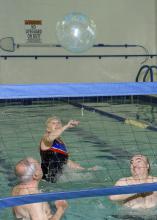Information Possibly Outdated
The information presented on this page was originally released on March 11, 2016. It may not be outdated, but please search our site for more current information. If you plan to quote or reference this information in a publication, please check with the Extension specialist or author before proceeding.
Project promotes fitness for all ages
STARKVILLE, Miss. -- A Mississippi State University social scientist is leading a project to promote healthy lifestyles in a state not usually known for its wholesome habits.
Ginger Cross, an assistant research professor in the MSU Social Science Research Center, is promoting the “WannaBee Healthy?” campaign, sponsored by a Science Education Partnership Award from the National Institutes of Health.
“We know from our research that time and health constraints are top reasons people have trouble getting enough exercise,” Cross said. “One of the key goals for this project is to encourage adults to get at least 150 minutes of moderate exercise each week.”
Cross said the project provides material to encourage more exercise in daily routines.
“Moderate exercise includes sporting activities, such as playing tennis or bicycling, but it can also include more routine activities such as brisk walking, heavy cleaning or gardening,” she said. “We also want children to be as active as possible. Current recommendations are for children ages 6 to 17 to get at least 60 minutes of activity daily.”
Cross said family activities can help all ages.
“Whether it’s a walk in the park on a sunny day or a dance party inside on a rainy day, these activities help our bodies and provide great memories at the same time,” she said.
David Buys, health specialist with the MSU Extension Service, said it is also important to consider how we can empower people to make healthier choices. Parents need to set good examples for their children to be active and choose healthy food options.
“Parents may want to limit their children’s screen time, including televisions, computers, tablets and smartphones, and they should lead by example,” he said. “Parents should not ignore their children’s weight problems as they begin to develop.”
Buys said caregivers need to lay healthy foundations for children as their nutritional habits are forming.
“Research shows that the earlier you can establish healthy habits, the more likely children are to adopt those and carry them forward throughout their life,” he said. “Integrating nutrition education into early education settings helps give kids exposure to these important habits, and combining that with parental education may increase the likelihood that healthier habits are adopted in the home, not just at school.”
For other activities promoting exercise, Cross recommended ideas on the “WannaBee Healthy?” website at http://partnershipsforhealthychildren.com/.




